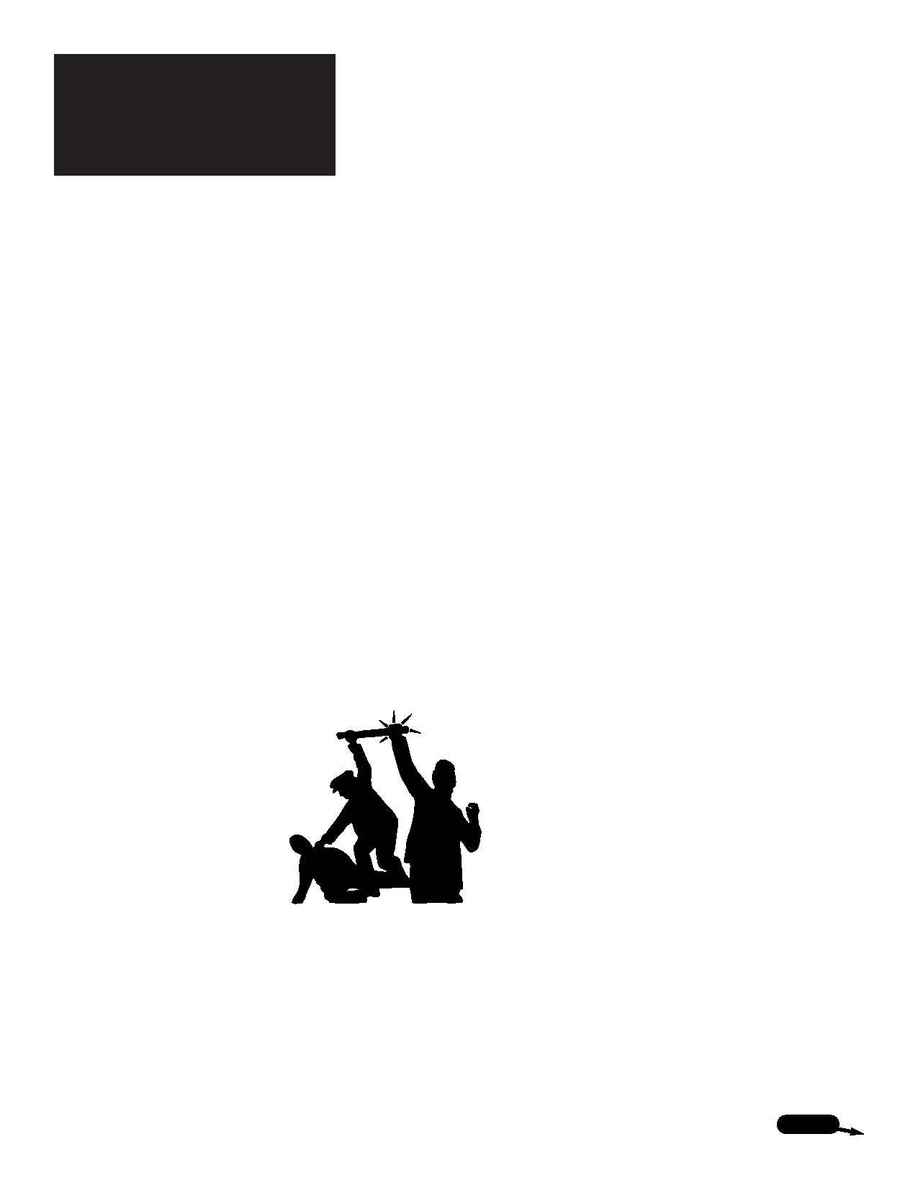
Across the country the epidemic of police
brutality continues to intensify. From Los Angeles,
where the L.A.P.D. is engulfed in the largest police
scandal in U.S. history, to New York where the
courts allowed the cops who gunned down Amadou
Diallo in a hail of 41 bullets to walk free and a wave
of police killings followed close on the heels of this
shameful verdict. Police and other law enforcement
agents continue to brutalize and murder people at
alarming rates and are still almost never punished by
the courts. Meanwhile on the southern border, I.N.S.
agents and sheriffs work handinglove with vigi-
lantes who are openly organizing the hunting and
lynching of immigrants. All too often, politicians
cover up this official brutality--or even applaud and
encourage it.
The authorities have subjected a whole gen-
eration of our youth to a cycle of criminalization
which includes: harassment for the color of their
skin, the way they're dressed or having too much
attitude; antigang laws that make it illegal to have a
beeper or even just hang out; warehousing them in
prison; and legally lynching them on death row.
Many of our communities have been turned into
killing fields. We must transform them into arenas of
resistance as we join together to throw these vicious
attacks back in their faces!
In recent years many, many people of
different races and from different
backgrounds have joined in this
important fight. Survivors of police
attacks, youth tired of being treated
like criminals, lawyers, religious
leaders, teachers, students and
many others have fought
back, often in the face of
open and underhanded
attacks. Stolen Lives: Killed by
Law Enforcement, which docu-
ments over 2,000 cases of
people killed by law enforcement in the U.S. in the
1990's, has put human faces on the problem of
police murder. October 22
nd
has become the day to
bring all this resistance together. This year, in the
midst of the national elections, we must force the
problem of police brutality even more into the light
of day.
On October 22, 2000, we call on you to join
us in saying NO MORE! No more to police brutality,
to repression and to the criminalization of a genera-
tion. Join us on the National Day of Protest to Stop
Police Brutality, Repression, and the Criminalization
of a Generation on October 22, 2000!
YOU MUST DO THIS BECAUSE:
·
Cops stop, search, harass and arrest people based
solely on the color of their skin. Too many peo-
ple have been victimized by the police for Dri-
ving While Black or Brown (DWB), for walking
while Black, for using a cell phone while Black.
·
Use of torture and other forms of cruel, inhuman
punishment against people in police custody is
widespread in the U.S.
·
Youth of color are more likely to be arrested,
held in jail and given longer sentences than white
youth, even when they face the same or similar
charges.
·
Police departments around the country are
increasingly employing harsh repressive tactics to
suppress dissent.
·
Mumia AbuJamal, revolutionary and
awardwinning journalist, victim of a trial that
was a travesty of justice, remains on death row
because of his outspoken opposition to police
brutality and other government injustice.
·
Over 3,600 people are on death row in the U.S.
Most of them are people of color, many of them
are innocent and almost all of them are too poor
to afford decent legal representation.
· Over two million people are in prison in the U.S.,
the most in the world. The majority are nonvio-
lent offenders. Women are the fastest growing
section of the US prison population.
· Each year, hundreds of immigrants die trying to
cross the U.S.Mexico border because the U.S.
government has militarized the border. In addi-
tion, many hundreds of immigrants are incarcer-
ated in maximum security prisons for the crime
of "trying to work". Also, at least 100 people are
incarcerated under "secret evidence" laws which
deny the person on trial access to evidence
which the state is using against him or her.
·
While killer cops continue to go free, family
members of police murder victims, witnesses in
police brutality cases, activists, attorneys, and
others have been harassed, physically attacked
National Day of Protest to
Stop Police Brutality,
Repression, and the
Criminalization of a Generation:
October 22
nd
, 2000
CALL
over
